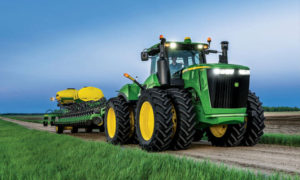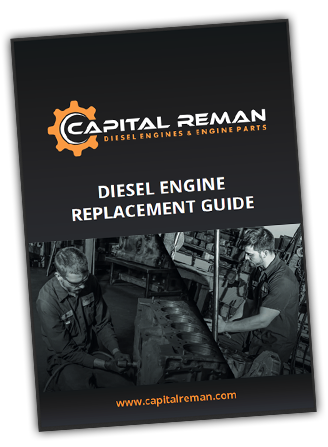Big Win For John Deere Owners Over ECM Modifications
 In the heavy duty equipment world there has always been an unspoken battle between the OEM (Original Equipment Manufacturer) and the Aftermarket and/or Independent Dealers. The rift goes back roughly 100 years when the first automotive dealers began popping up in mass. Ford, GM, Chrysler as well as long gone brands like Plymouth, Auburn and Hudson all kept an efficient supply chain including the service department, dealership, wholesaler and manufacturer.
In the heavy duty equipment world there has always been an unspoken battle between the OEM (Original Equipment Manufacturer) and the Aftermarket and/or Independent Dealers. The rift goes back roughly 100 years when the first automotive dealers began popping up in mass. Ford, GM, Chrysler as well as long gone brands like Plymouth, Auburn and Hudson all kept an efficient supply chain including the service department, dealership, wholesaler and manufacturer.
They made sure that car owners returned to the dealer for service and maintenance by creating OEM only parts. Aftermarket parts were virtually non-existent and the ones that were manufactured were of poor quality or were hand crafted by small service shops. OEM Dealers reigned king up until the mid 1990s when Aftermarket Parts became less expensive and the quality matched or exceeded OEM Specs. Many dealerships saw a loss of service revenue. Today in 2017 the right to repair issue between OEM and Independent Shops is an ever increasing debate.
Many customers in the heavy duty equipment industry are upset with OEM Dealers; specifically dealerships over the right-to-repair laws. The issue is that new agriculture and off-road construction equipment now comes equipped with electronic control modules that make it nearly impossible for an owner to service their equipment without going to the dealership. Oftentimes these repairs are quite costly and “hold the customer for ransom”. ECMs in diesel engines were first introduced with the Detroit 60 Series in the late 1980s but became mainstream in the late 1990s to 2000s. Mechanical engines were essentially 100% replaced with electronic engines primarily due to emissions control regulations enacted by the EPA.
New tractors, dozers, and excavators now come jam packed with electronics and computers that have the ability to shut down the vehicle and ping the dealership with machine/service data. All of this new software is also a new point of failure on these machines requiring expensive repairs. Farmers are fed up with the high prices and slow service at authorized dealers. Going to the dealer over every little issue is getting expensive. It is affecting their bottom lines which are in many cases already tight. When a piece of equipment is sold at a John Deere dealership the customer owns the equipment outright however the license agreement forbids farmers to sue for “crop loss, lost profits, loss of goodwill, loss of equipment … arising from the performance or non-performance of any aspect of the software.”
Farmers are fed up with the high prices and slow service at authorized dealers. Going to the dealer over every little issue is getting expensive. It is affecting their bottom lines which are in many cases already tight. When a piece of equipment is sold at a John Deere dealership the customer owns the equipment outright however the license agreement forbids farmers to sue for “crop loss, lost profits, loss of goodwill, loss of equipment … arising from the performance or non-performance of any aspect of the software.”
When there is a will there is a way. Many are finding cheaper alternatives to the dealers by turning to online hacking forums where rigged software is sold to hack into the ECM devices. The software circumvents the John Deere code allowing farmers to once again work on their own farm equipment.
Hacking into the electronic components of a diesel engine is not illegal. As of 2016 the Librarian of Congress announced that tinkering with the electronic components of an engine, vehicle or equipment is no longer a violation of the Digital Millennium Copyright Act (DMCA).
The ruling allows for consumers to make modifications to the ECM for purposes of “good faith security research” and “lawful modification”. Lawful modification dictates that users cannot change or alter any software related to the emissions abatement technology. There are companies that sell DPF Delete Kits and ECM Re-flashes which are still illegal.
The ruling, which is often revisited, came about due to pressure from equipment owners stating they could no longer repair their own vehicles. The Librarian of Congress (head of the Library of Congress) ruled that by not allowing full access to the ECM Software that the vehicles are still partially owned by the manufacturer. Prior to the ruling doing an ECM Tune-up or Performance Upgrade was deemed illegal. Manufacturers claimed that their proprietary code is the businesses' intellectual property which shouldn't be edited, enhanced or deleted under penalty of law.
The standard OEM dealer's response regarding the ruling is that they deem unauthorized access of the ECM Software to be a safety hazard claiming that by changing the software the equipment no longer complies with industry safety/environmental regulations. They fear parts replacements will go unnoticed thus causing potential harm to the driver. The company also stated that the dealer channel is very important because it provides trained technicians that have the expertise to work on specialized equipment at the dealer or in the field. The ECM Software works by giving the dealer remote access to the vehicle to help diagnose issues in real time which would then trigger an on-site service call. Lastly, the dealerships countered with the fact that their vehicles are indeed repairable by owners as all of the technical, diagnostics, parts and operation manuals are available to the public.
The Librarian of Congress ruling expires next year where it will be up for review once again. You can bet the debate will continue for years to come however for the time being farmers and vehicle owners are once again rejoicing a win over the old school dealership model.




